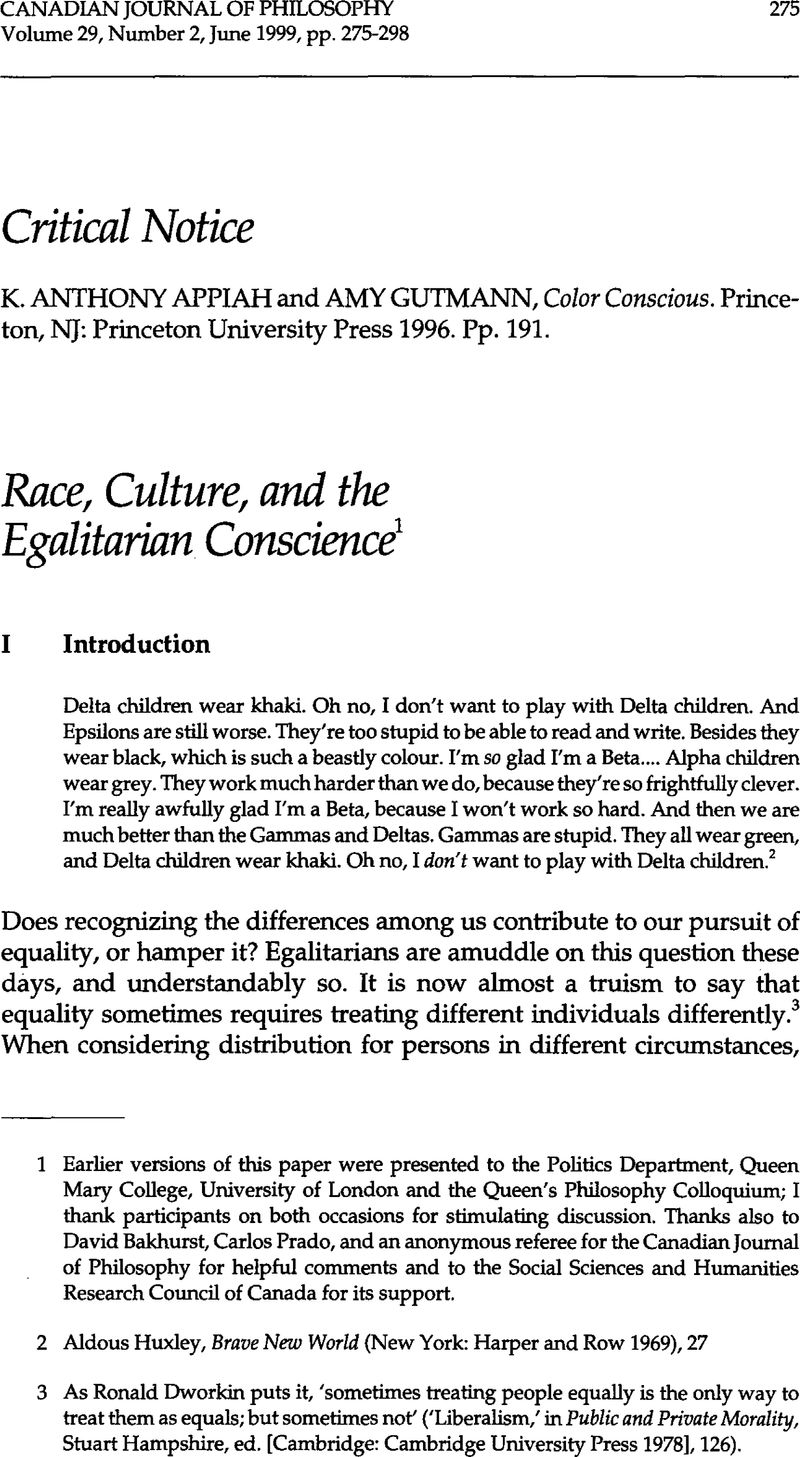No CrossRef data available.
Article contents
Race, Culture, and the Egalitarian Conscience
Published online by Cambridge University Press: 01 January 2020
Abstract

- Type
- Critical Notice
- Information
- Copyright
- Copyright © The Authors 1999
Footnotes
Earlier versions of this paper were presented to the Politics Department, Queen Mary College, University of London and the Queen's Philosophy Colloquium; I thank participants on both occasions for stimulating discussion. Thanks also to David Bakhurst, Carlos Prado, and an anonymous referee for the Canadian Journal of Philosophy for helpful comments and to the Social Sciences and Humanities Research Council of Canada for its support.
References
2 Huxley, Aldous Brave New World (New York: Harper and Row 1969), 27Google Scholar
3 As Dworkin, Ronald puts it, ‘sometimes treating people equally is the only way to treat them as equals; but sometimes not’ (‘Liberalism,’ in Public and Private Morality, Stuart Hampshire, ed. [Cambridge: Cambridge University Press 1978], 126)Google Scholar.
4 Marx, Karl ‘Critique of the Gotha Programme,’ in Marx-Engels Reader, Tucker, R. ed. (New York: W.W. Norton 1978), 531Google Scholar
5 The literature on difference in political and social theory is enormous, but some good representatives are Laclau, Emesto and Mouffe, Chantal Hegemony and Socialist Strategy (London: Verso 1985)Google Scholar; Minow, Martha Making All the Difference: Inclusion, Exclusion and American Law (Ithaca, NY: Cornell University Press 1990)Google Scholar; and Young, Iris Marion Justice and the Politics of Difference (Princeton, NJ: Princeton University Press 1990)Google Scholar. I critically appraise these and other writings on difference in ‘Some Disquiet About Difference,’ Praxis International 13 (1993) and ‘Impartiality after Difference,’ Review of Constitutional Studies 3.2 (1996).
6 ‘Allophone’ is Quebecois slang for immigrants and their descendants.
7 Aristotle, Ethics: The Nicomachean Ethics, trans. Thomson, J.A.K. (Harmondsworth, UK: Penguin 1976), 177–8Google Scholar
8 Appiah gives a more detailed account of how considerations of biology militate against race in Appiah, Kwame Anthony In My Father's House: Africa in the Philosophy of Culture (New York: Oxford University Press 1992), 34–7Google Scholar.
9 Ibid., 13-15
10 Hacking, Ian ‘Making Up People,’ in Reconstructing Individualism: Autonomy, Individuality and the Self in Western Thought, Heller, T. Sousa, M. and Wellbery, D. eds. (New York: Routledge 1992); cited by Appiah at 78.Google Scholar
11 Or at least, we as egalitarians believe this; cf., for example, Thomson, Judith Jarvis ‘Preferential Hiring,’ in Equality and Preferential Treatment, Cohen, Marshall Nagel, Thomas and Scanlon, Thomas eds. (Princeton, NJ: Princeton University Press 1976)Google Scholar.
12 Walzer, Michael Spheres of Justice (New York: Basic Books 1983), 154Google Scholar
13 West opens his book, Race Matters, with what might be called an ordinary extraordinary story about unsuccessfully hailing a taxicab in New York. Over an hour, ten cabs refuse him and he is forced to take the subway and walk to his appointment with his publishers, arriving late.
14 McGary, Howard ‘Forgiveness and Slavery,’ in McGary, Howard and Lawson, Bill E. Between Slavery and Freedom (Indianapolis and Bloommgton: Indiana University Press 1992), 110–12Google Scholar. Lawson notes the need for a word like ‘refugee’ to designate the descendants of slaves to capture the idea that slavery has persistent and deep-seated cultural and psychological effects which might require affirmative action for their remedy. See his ‘Moral Discourse and Slavery,’ also in McGary and Lawson.
15 See Winant's, Howard thoughtful essay, ‘Behind Blue Eyes: Whiteness and Contemporary US Racial Politics,’ New Left Review 225 (1997)Google Scholar. (Interestingly, presumably in deference to South Americans, Winant deploys the more specific term ‘North American’ to refer to the U.S., falling into an imperialism which overlooks the 49th parallel!)
16 Boxill, Bernard ‘Equality, Discrinllnation and Preferential Treatment,’ A Companion to Ethics (Oxford: Basil Blackwell 1991), 338Google Scholar
17 See ibid., 339-41 and ‘The Morality of Preferential Hiring,’ Philosophy and Public Affairs 7 (1978).
18 Harris, Luke Charles and Narayan, Uma ‘Affirmative Action as Equalizing Opportunity: Challenging the Myth of “Preferential Treatment’” in Ethics in Practice: An Anthology, Lafollette, Hugh ed. (Oxford: Basil Blackwell 1997)Google Scholar
19 West, Cornel Race Matters (Boston: Beacon Press 1993), 63Google Scholar
20 See Pojman, Louis P. ‘The Moral Status of Affirmative Action,’ in Morality in Practice, Sterba, James ed. (Belmont, CA: Wadsworth 1997), 240–1Google Scholar. Reprinted from Public Affairs Quarterly.
21 Ibid., 65, 64
22 Thernstrom, Abigail Whose Votes Count? Affirmative Action and Minority Voting Rights (Cambridge, MA: Harvard University Press 1987), 240Google Scholar
23 Walzer, Michael ‘Pluralism: A Political Perspective,’ in The Harvard Encyclopedia of American Ethnic Groups, Thernstrom, Stephen ed. (Cambridge, MA: Harvard University Press 1980)Google Scholar; reprinted in Kymlicka, W. ed., The Rights of Minority Cultures (Oxford: Oxford University Press 1995), 251Google Scholar
24 Ibid., 242
25 Ibid., 243
26 Thus in his introduction to the Appiah and Gutmann essays, David Wilkins laments the tenuous links between Africa and African-Americans, something that ‘separates African-Americans from every other group of hyphenated Americans,’ yet he speaks hopefully of enjoyment of ‘our rich cultural heritage’ as something democratic institutions ought to foster (15). An interesting critique of the term African American is provided in Grant, Ruth W. and Orr, Marion ‘Language, Race and Politics: From “Black“ to” “African-American,”’ Politics and Society 24.2 (1996)CrossRefGoogle Scholar.
27 He maintains, however, that such ‘cathartic appeals to black authenticity’ are also misguided. They embody a ‘closing-ranks mentality,’ a reluctance to ‘link race to the common good’ and a refusal to engage in genuine moral assessment of the diverse perspectives of black Americans (West, Race Matters, 4, 32, 28).Google Scholar
28 Taylor, Charles ‘The Politics of Recognition’ in Multiculturalism (Princeton, NJ: Princeton University Press 1994), 28–37CrossRefGoogle Scholar
29 Ibid., 70-1
30 Ibid., 58-9
31 Hall, Stuart ‘Negotiating Caribbean Identities,’ New Left Review 209 (1995), 5Google Scholar
32 Appiah, In My Father's House, 41-2Google Scholar
33 See also Appiah, K. Anthony ‘Identity, Authenticity, Survival: Multicultural Societies and Social Reproduction,’ in Taylor, Multiculturalism, 162–3Google Scholar.
34 See Kahlenberg, Richard ‘Class, Not Race,’ New Republic (3 April 1995).Google Scholar
35 I am grateful to an anonymous referee from the Canadian Journal of Philosophy for this point.




